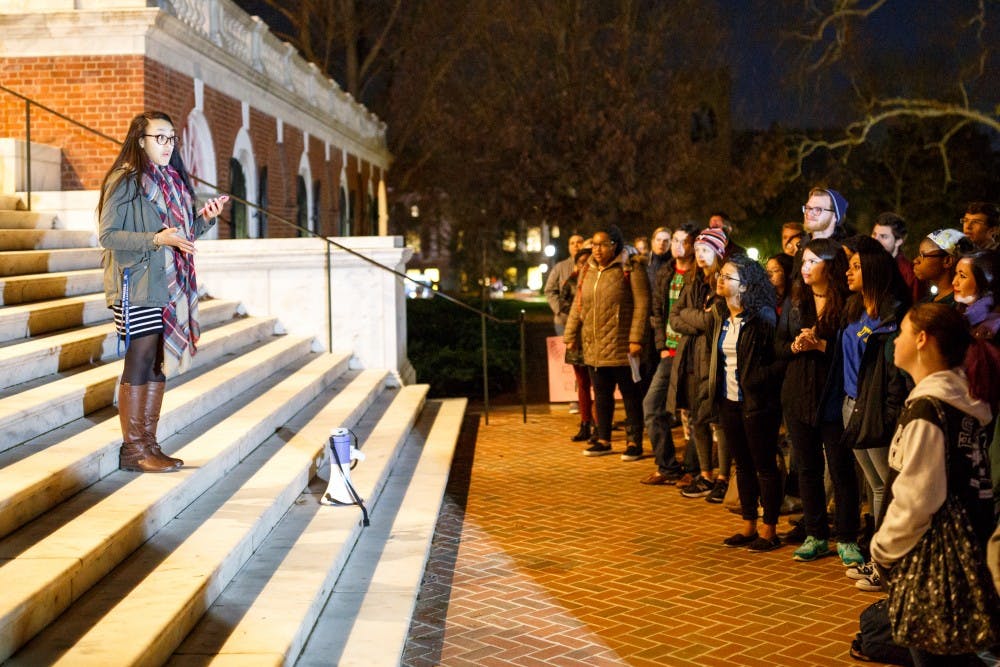A group of University students gathered together at the steps of the Rotunda Friday night to participate in a student-led march against sexual assault and harassment. The march, officially titled “Breaking Silence,” was prompted by a recent rise in reports concerning sexual assault and misconduct by male figures in the public eye, as well as the #MeToo movement.
With some students carrying signs speaking out against sexual assault, a group of about 30 to 40 attendees gathered on the north side of the Rotunda to begin the event. Before the march itself, student leaders from various organizations spoke to the crowd. Some students read prepared statements from their organizations and others spoke freeform. Speakers also discussed the impact of the recent rise in publicized sexual harassment and assault allegations against prominent figures as well as the media’s treatment of the situation.
Some spoke of their personal views on the matter and shared individual anecdotes, and others discussed how their respective organizations offer unique perspectives towards issues of sexual misconduct.
Francesca Callicotte, a third-year College student and head organizer of the Breaking Silence march, said in her introductory remarks to the crowd that, “It is especially important that we take our anger and our disappointment and turn it into something unifying, and turn it into something progressive, so that we can make [a] change.”
The speakers emphasized the role of students and the University in addressing and responding to the culture of sexual violence.
"After the Harvey Weinstein allegations, there has been a purge in the entertainment industry of sexual predators, but this sort of harassment exists in all institutions, including our own,” Callicotte said. “I wanted the march to exist as a means to address the fact that sexual assault is an ever-present and persistent issue, and that everyone, both men and women, are impacted by it.”
Hannah Mezzacappa, a fourth-year College student and president of One Less, an all-female sexual violence prevention and peer education group on Grounds, told to the crowd that it could take a stand in changing the culture surrounding sexual assault.
“This is a culture that we, all of us, create,” Mezzacappa said. “But it is a culture that we, all of us, can change.”
Speakers emphasized their organization’s role and perspective towards this issue, as well as offering relevant facts and opinions meant to provoke thought and educate the audience.
Kevin Hare, a fourth-year College student and president of One in Four — One Less’s all-male counterpart — spoke of the gendered nature of this violence, how the titular “one in four” college women have been victims of attempted rape or rape in their lifetime and the responsibility of men and masculinity in confronting this issue.
Rawda Fawaz, a third-year College student and vice president of DREAMers on Grounds, said during the event that undocumented immigrants are uniquely vulnerable to sexual assault. She said there is the constant threat of deportation instead of securing justice for a survivor who may go to the police.
These speakers and others addressed the issues and dynamics of race, sexuality, gender, class, documented status and accessibility to resources for survivors as all being relevant factors in the culture of sexual violence.
After several student leaders spoke on the steps of the Rotunda, the speakers led the crowd of students on a march to Madison Bowl, chanting phrases such as “My body, my choice” and “Hey hey, ho ho, violent men have got to go.” Once arriving at “Mad Bowl,” the chants continued for a number of minutes facing the fraternity and sorority houses, before ceasing to allow for the concluding student speakers.
“We wanted to turn our anger and disappointment into something productive and hopeful,” Callicotte said. “In the end, we care so much about our community that we are willing to point out the flaws and issues within it so that we can move forward and create a better future for everyone."







